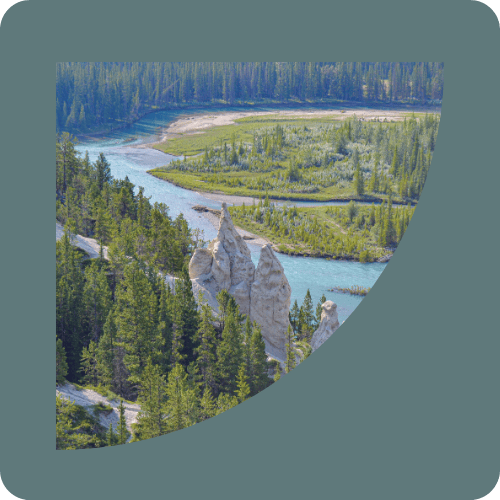Manvi Bhalla’s Toronto Climate Strike Speech 2020
Author
Manvi Bhalla
My commitment to intersectional justice began at age 11, and is deeply informed by my lived experiences as a Sikh woman from Punjab, who immigrated to Canada at age 3, and who navigates the world with a neurodiverse perspective. My lived experiences growing up in urban and suburban Canadian cities– where racially-minoritized new immigrants, particularly women, continue to experience disproportionate exposure to environmental hazards, alongside reduced access to benefits such as green and natural spaces– has shaped my understanding of environmental justice.
I presently live on the unceded territories of the xʷməθkʷəy̓əm (Musqueam), Sḵwx̱wú7mesh (Squamish), and səlilwətaɬ (Tsleil-Waututh) Nations, and I am immensely grateful for the land defense efforts that have allowed for me to connect with the natural world around me. These experiences continue to deepen my passion for environmental stewardship and justice.
My educational background, with a BSc Hons in Biomedical Science, an MSc in Public Health and Health Systems, and currently as a PhD student in Resources, Environment, and Sustainability, has shaped my understanding of the climate crisis as a critical public health issue. My research focuses on inclusively integrating the experiences, knowledges and expertise of racially, ethnically, and gender-minoritized communities into environmental health policy-making.
As a founder and Executive Director of Shake Up The Establishment, I am dedicated to upholding our mission and values by amplifying the voices, experiences and expertise of underserved, minoritized and marginalized communities and working alongside them to promote equity and climate justice. My lived experiences and academic background empower me to lead our organization with a deep commitment to intersectional and anti-colonial approaches, ensuring that our work not only acknowledges but actively addresses the systemic inequities that disproportionately impact marginalized communities. By integrating intersectional feminist and anti-racist approaches into our work, we strive to create a movement that is inclusive, equitable, and transformative. My goal is to contribute to a collective liberation from oppressive systems, where all individuals and communities can thrive in healthy, safe, and equitable environments. I am committed to leading SUTE in a manner that helps us to advance towards just, equitable, and sustainable futures for all.

Do you remember the first time you felt eco-grief? An ache in your heart for the ongoing loss of our home, and a panic fuelled by feelings of helplessness? That panic was, and is, a physiological response to a threat, and that threat, as we’ve all come to know it, is climate change.
Now, climate change isn’t what most people think it to be. Popularly conceptualized as the problem, I instead want to share with you that climate change is rather a soon-to-be fatal symptom of a larger series of system failures that have been going on long before we started labelling them as problematic, and they are the root causes of our grief. Capitalism, the system that prioritizes profit over people; the same that fuelled industrialization to the point where we recognize we don’t have a viable future with it, but we don’t have an immediately viable way of life outside of it either. The patriarchy, which marginalizes the input, intelligence and authority for 50% of our world’s population and alone makes many of the decisions for them. White supremacy, the systematic domination of one race over all others using tools of violence; this violence, often silent yet pervasive, leads to sub-systems entrenched in biases rigged to favour one group and oppress others. Bringing these together, you can understand why change is near impossible without fundamentally deconstructing the world we know. Our world and its systems are not working for the future, they’re working for the few, and a just recovery cannot exist in the same space as it, nor be built with the same tools that led to it. Our current world is rigged to favour and accumulate power with a few, and those few hold the fate of the world, and our lives in their hands, and so I want to validate your panic. This is an attack on our livelihoods; our present, and our future.
Science says that climate change is largely a human-made issue, and it is fuelled by the astronomically high fossil fuels we burn daily to sustain life as we know it. This burning of fossil fuels for oil and gas, transportation, buildings, electricity, industry, agriculture and waste in order of highest to lowest, produce Canada’s greenhouse gas emissions. These emitted gases trap heat in the atmosphere and this leads to rising global temperatures, which then causes a whole host of impacts that differ from region to region, but that threaten our “normal” way of life, from floods to fires; storms to rising seas and more.
To counter this, the privileged decision makers that built this world up around us ask that we make individualistic changes, by reducing our “carbon footprint”, or making “sustainable” choices and alongside this, they present us with limited or inaccessible alternatives to fossil fuel consumption and consumerism. As if that will fix the systems-based issues at the root of the problem! According to Energy Policy Tracker, the Canadian government has invested 16.4 billion Canadian dollars into fossil fuels since the beginning of the COVID-19 pandemic, with 67.9% of it being fossil fuels without any climate targets or additional pollution reduction requirements, meaning purely dirty, non-renewable energy. By contrast, they invested 3.99 billion into clean energy. This only reinforces that we are living in an environment where progress is still synonymous with colonial views of commodification, privatization and profit, of the land and all its resources– and this is simply not sustainable. This is not where our priorities, nor our money, should lie.
Finally, it’s important to note that the impacts of climate change may be inconvenient for some but may be fatal to others highlighting the urgent need to take action. To quote the UN, “the impacts of climate change will not be borne equally or fairly, between rich and poor, women and men, and older and younger generations. Consequently, there has been a growing focus on climate justice, which looks at the climate crisis through a human rights lens and on the belief that by working together we can create a better future for present and future generations.” Essentially, climate justice is a human-centered approach, informed by science, which works to protect the rights of all people equitably, including those most underserved by these aforementioned systems– and this is a fundamental framework we need to adopt within our movement, to help in achieving a Just Recovery.
So what can we do? First, we must not be immobilized by this threat. That is not an option.
Second, we must recognize that many of our and our ancestors’ successes came as a result of the violation of many treaties, and that has played a leading role in getting the world into the state it is in today. These treaties are sacred agreements made to protect the land and all its inhabitants, including its rightful owners and stewards, the First Peoples. With all this in mind, I want to encourage us all to centre the voices of community in the work we do, take up less space where we can, and offer more to the collective recovery of the land and all its peoples. Alongside this, we cannot fix a problem that has its roots this deep in colonization, the belief of profit over people. We need to actively decolonize our world, and the way we work, live and interact on our land, upon which we are guests, and where we are all treaty people.
Third, I want to tell you that it is your personal duty to make this world a better place. In our current society, we often think we are only responsible for ourselves. But there’s no way out of this issue without the strength of community, and community means that none of us win, till we all win, or in this case, we won’t win until all of us unite over divestment and transitioning to a clean economy. We need to take personal responsibility for this issue, and internalize that it’s up to each of us to do our best to fix the world that our ancestors left for us.
Climate change is not a partisan issue, and neither are human rights, so thus, neither is a Just Recovery. Remember, none of these are radical ideas or unattainable goals. They are the bare minimum, and they are entirely possible when we each take personal responsibility for doing the best we can to address them, and when we choose to speak up about them at all times, including when it’s inconvenient to do so.



